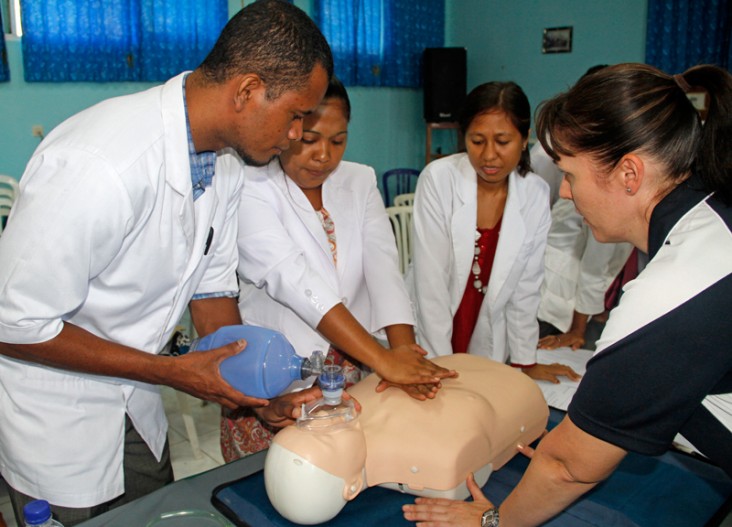|
Purpose: To ensure effective delivery of responsive health services at the national and sub-national levels by emphasizing capacity building and institutional strengthening of the Government of Timor-Leste’s Ministry of Health (MOH) |
Location: Nationwide with special focus on Ermera, Manatuto, and Oecusse districts |
|
Partner: John Snow, Inc. (JSI) |
Duration: October 2011 – November 2015 |
|
Contract: $12 million |
|
|
Partner Contact: Dr. Reginald F. Gipson Chief of Party Email: rfgipson@gmail.com |
USAID Contact: Tanya Wellsbrown Health Team Leader Email: twellsbrown@usaid.gov |
Background:
The Government of Timor-Leste (GOTL) has made progress in establishing basic health services but has struggled to provide vital maternal and child health, family planning, immunization, and emergency care services in the more remote and mountainous areas where the majority of the population resides. While health outcomes, including child mortality rates and service delivery statistics, are improving; significant challenges still face the health sector, including low utilization of public health services and an inclination toward the use of traditional medicine due to lack confidence in provider quality. Geographical difficulties in accessing health care and long distances to health facilities discourage attendance. In addition, conservative cultural and religious beliefs often slow down the rate of social change, especially in the areas of reproductive health, maternal health, and family planning.

Summary:
USAID’s Health Improvement Project, locally known as HADIAK (To improved), focuses on maternal, neonatal, and child health systems strengthening, with a particular emphasis on helping district-level health committees prepare for and support the eventual de-concentration of GOTL health services. USAID’s HADIAK Project does not provide direct service delivery, but instead equips MOH institutions with the improved organizational frameworks, human resources, and technical skills needed to implement the government’s National Health Sector Strategic Plan.
HADIAK works in three of Timor-Leste’s 13 municipalities and assists the MOH to improve the quality of family planning and contraceptive service delivery through in-service training and supervision of the MOH. The project also supports the MOH with outreach and community health promotion events that create demand for family planning services in underserved rural communities.
HADIAK supports the MOH’s efforts to reduce preventable child and maternal deaths and improve maternal, neonatal, and child health by helping the MOH to implement evidence-based protocols in maternal and child health service delivery; increase demand for maternal and child health services through health promotion activities and community mobilization; develop and implement district service delivery plans; increase community engagement around key maternal and child health issues; and effectively engage with key partners from the WHO, UNFPA, and UNICEF to develop the new MOH Maternal, Newborn, and Child Health Strategy.
Aligning with the MOH’s priority to improve human resource capacity in the health sector, HADIAK supports the MOH to reintegrate newly-trained Timorese doctors returning from Cuba; implement primary health care (PHC) and ensure that facilities in targeted districts are equipped and maintained to deliver PHC services; improve the clinical skills of health workers who deliver maternal, neonatal, and child health services; and support the MOH Directorate of Quality Control and Ethics to implement minimum standards for maternal and child health service delivery. In addition, to enhance the quality of PHC service delivery across Timor-Leste, the project has worked with the U.S. Navy’s construction arm, the Seabees, and the MOH’s infrastructure unit to support the rehabilitation of existing community health clinics and health posts in target districts.
Results:
Major project impacts include the development and application of Supportive Supervision using the Health Facility Readiness Format, which was adopted by the MOH as a national strategy to improve the quality of health services; the introduction of the Non-pneumatic Anti-Shock Garment—a simple to use and maintain velcro garment which prevents blood loss and shock due to post-partum hemorrhage—which has helped to save the lives of over 40 women as of October 2015 and is being adopted by the MOH for nationwide use; supporting the MOH to conceptualize, design, pilot, and scale-up the national PHC Guidelines, conduct a service provider needs assessment, update training materials, and conducted post-training follow-up to assess provider competency to improve service quality; and working with village leaders to strengthen community-level services and improve health behaviors.








Comment
Make a general inquiry or suggest an improvement.